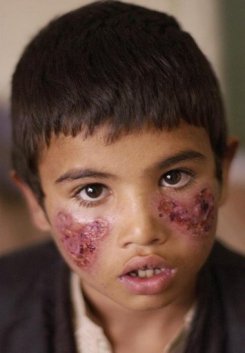
A 10-year-old Afghan leishmaniasis patient is pictured at a Kabul hospital. Afghanistan's health authorities Friday appealed for international help in dealing with a parasitic disease that is believed to threaten millions in the impoverished country.
Afghanistan's health authorities Friday appealed for international help in dealing with a parasitic disease that is believed to threaten millions in the impoverished country.
Leishmaniasis, transmitted by a species of sandfly, threatened the health of 13 million Afghans, the World Health Organisation (WHO) said in a report on neglected tropical diseases.
It said the disease had affected an estimated 65,000 people in Kabul in 2009, markedly higher than the 17,000 who were expected to get the disease each year, but many more were likely to have been hit due to under-reporting.
"This number is likely to be the tip of the iceberg as cases are grossly under-reported owing to poor diagnostic tools and the stigma that is attached to this disease," WHO's Afghanistan representative Peter Graaff was quoted as saying.
The main symptom of the disease is skin sores that erupt weeks to months after the victim has been bitten, WHO said.
An outbreak of leishmaniasis had hit the western city of Herat, it said, adding that it was preventable with the use of bed nets and could be treated with drugs.
WHO quoted the acting minister of public heatlh, Suraya Dalil, calling for international help in tackling the disease.
"The high cost of treatment makes it difficult to integrate anti-leishmaniasis drugs into the basic package of health services," she said.
"I urge donors to take this cause seriously, as it causes unnecessary suffering amongst a large number of Afghans." -- AFP



